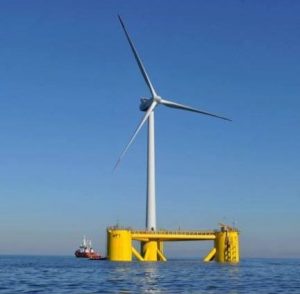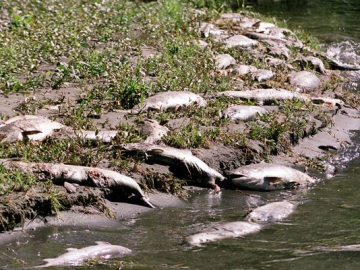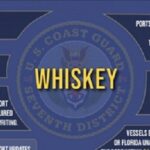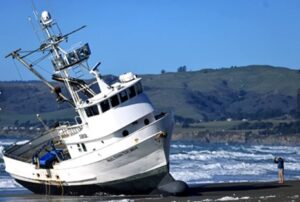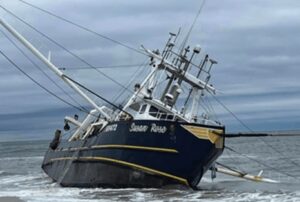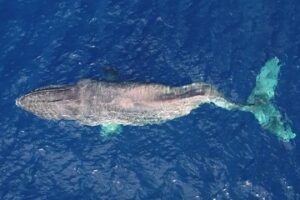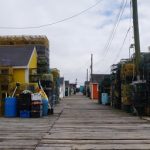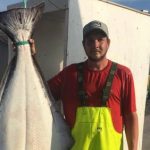Tag Archives: Pacific Coast Federation of Fishermen’s Associations
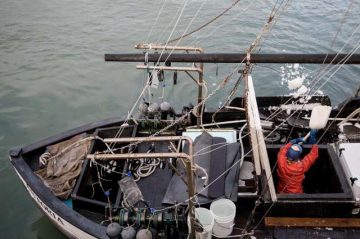
California fishermen report the biggest salmon season in a decade
California commercial fishermen are reporting the biggest king salmon season in a decade, on the heels of three years of disastrously low catches because of the drought. The sudden bounty has resulted in a price drop for the coral-pink, fatty fillets to $20 per pound in many markets, down from the $30- to $35-per-pound range of recent years. “You might say this is the old normal, because we’ve been so used to catastrophe,” said Noah Oppenheim, >click to read<19:37
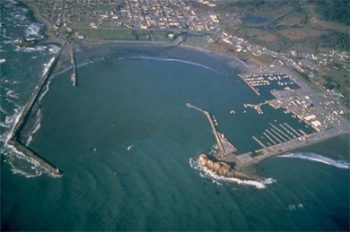
Commercial salmon season starts in Crescent City
Commercial salmon fishermen in Crescent City began their season on Saturday with a quota of 20 chinook per day and a monthly quota of 2,500, according to Crescent City Harbor Commissioner and Del Norte Fisherman’s Association president Rick Shepherd. The 20-fish-per-day quota and monthly quota of 2,500 applies to trawlers fishing between the Oregon border and the Humboldt South Jetty, said Shepherd, whose boat is one of roughly six in Crescent City that fish for chinook. The fleet is able to ply its trade on the ocean five days a week Friday through Tuesday. While a few fish have been brought into Eureka, so far no one has brought any salmon into the local harbor, Shepherd said. >click to read>07:50
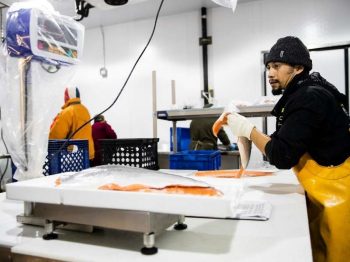
King salmon arrives in stores, commanding royal prices; relief could come soon
King salmon, once as ubiquitous as burgers in backyard Bay Area barbecues, has commanded astonishingly high prices in recent years,,, Since the 2019 season opened on May 1, supply has been very limited, so prices have remained steep, reaching as high as $40 a pound in San Francisco.,,, That should start to change on Thursday, when 200 more miles of coast will open to commercial salmon fishing,… there will likely be more salmon on the market this summer is because some crab boats are planning to go out for salmon fishing, because the Dungeness crab fishery closed several months early as part of a settlement,,, >click to read<21:54
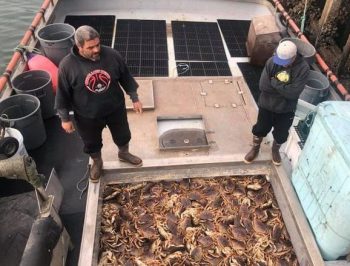
California’s Commercial Crabbing Season to End Three Months Early
Center for Biological Diversity Press Release: SAN FRANCISCO— Californians will be pleased to know that Dungeness crab will be caught off the coast with greater care for endangered wildlife under a settlement announced today by the Center for Biological Diversity, the California Department of Fish and Wildlife and the Pacific Coast Federation of Fishermen’s Associations. The legal settlement protects whales and sea turtles from entanglement in commercial Dungeness crab gear. The Center for Biological Diversity sued the state wildlife department in October 2017,,, >click to read<15:02

California Crabbers Could Feel the Pain, State Reaches Tentative Agreement With Enviro Group Over Whale Entanglement
The California Department of Fish and Wildlife and the Center for Biological Diversity have tentatively agreed to settle an ongoing lawsuit, which claims that the state’s lack of action in preventing whales from becoming entangled in commercial crabbing lines violates the Endangered Species Act.,,, The Center for Biological Diversity filed the suit in 2017 after a record number of entangled whales were observed off the coast of the Western United States between 2014 and 2016. >click to read<08:55

California could be held liable for whale entanglements
The Center for Biological Diversity is hopeful its lawsuit filed over whale and sea turtle entanglements is nearing its conclusion after a federal judge suggested she may find the California Department of Fish and Wildlife liable for the entanglements, a center spokesman said.,,, The two parties have until March 13 to work out their differences and report back to the judge. If no settlement is reached, the judge will issue a finding. >click to read<12:17

Fishermen unite to sue big oil
Almost a month has gone by since fishermen in California and Oregon filed suit against big oil in California’s Superior Court, demanding compensation for damages done to the fishing industry. The lawsuit is colloquially being called the crabbers’ suit because many of the members making up the plaintiff, The Pacific Coast Federation of Fishermen’s Associations, rely on crabbing for their livelihoods. The federation is suing the fossil fuel industry, including major companies like Chevron, ExxonMobil, BP, and Shell Oil, under the claim that it has known about the dangers of fossil fuels and climate change for decades but has deliberately hidden information from the public as well as spread misinformation campaigns. >click to read>12:35
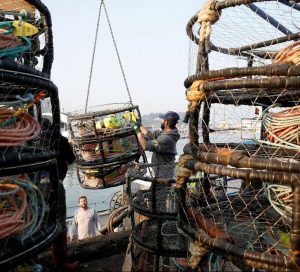
Crab fishermen and environmentalists square off over whale entanglements
The issue has pitted two local interest groups against each other: Those who depend on the $68 million California Dungeness crab fishery for their livelihood, and those who advocate shutting down areas to crabbing to protect humpback whales and other endangered species. Caught in between are everyday shoppers who love having Dungeness crab on their tables, but probably wouldn’t want marine mammals hurt in the process. “I’m frankly very scared of what the upcoming season could mean for whales,” said Kristen Monsell, senior attorney at the Center for Biological Diversity, an Oakland environmental group that sued the state over the issue last year. The case is due to go before a judge in February. >click to read<13:23
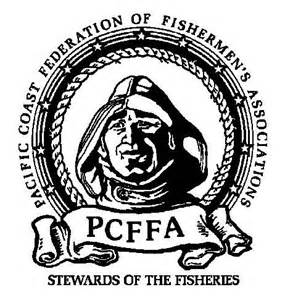
Crab Fishermen Sue Fossil Fuel Industry Over Climate Change Damage
Crab fishing on the West Coast has become so threatened by warming oceans that a coalition of commercial fishers has now joined the climate litigation fray with a lawsuit filed Wednesday to hold 30 fossil fuel companies accountable for losses caused by climate change. The lawsuit, filed in San Francisco County Superior Court by the Pacific Coast Federation of Fishermen’s Associations, seeks damages on behalf of crab fishers, their businesses and families, and local communities in California and Oregon. It describes losses caused by the closing of crab fishing waters over the past four years because of algae blooms in the warming Pacific waters, and warns that these closures will keep happening as warming continues. >click to read<19:31

Orcas, fishermen are both endangered species
Orcas and commercial salmon fishermen share a common crisis — both need more adult Chinook salmon to return to the Columbia River; orcas to avoid starvation, fishermen to sustain their livelihoods and families. Northwest orcas are starving and their population is declining — only 74 remain, in large part because their primary prey, Chinook salmon, have been pushed by dams, dewatering and habitat destruction to near extinction almost everywhere.,, Salmon fishermen too are now effectively an endangered species, and for the same reasons as orcas — their Chinook salmon prey. <click to read<

Farmers protest California water plan aimed to save salmon
Hundreds of California farmers rallied at the Capitol on Monday to protest state water officials’ proposal to increase water flows in a major California river, a move state and federal politicians called an overreach of power that would mean less water for farms in the Central Valley. “If they vote to take our water, this does not end there,” said Republican state Sen. Anthony Cannella. “We will be in court for 100 years.” Environmentalists and fishermen offered a different take on the other side of the Capitol to a much smaller audience. “For the 50 years corporate agriculture has been getting fat,” said Noah Oppenheim of the Pacific Coast Federation of Fishermen’s Associations. “Salmon fisheries have been tightening belts.” >click to read<13:17
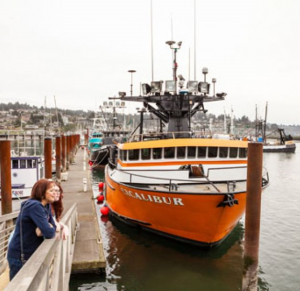
Salmon decline reveals worrisome trend
The sad story of an orca carrying her dead calf for 17 days off the Washington coast this month has garnered global attention to the plight of killer whales in the region. It has also highlighted the steep decline in the region’s salmon stocks, the resident orcas’ sole food source. ,, That is because the availability of Pacific Ocean salmon has been trending low for the past decade. The total pounds of chinook salmon caught off the Oregon coast in 2017 fell 40% compared with the year before, according to Oregon Department Fish & Wildlife (ODFW) data. Between 2014 and 2017, total pounds caught dropped 80% and the value of the catch dropped 72% to $5 million. Drought in California and nutrient-starved ocean conditions are blamed for the decline. >click to read<16:15
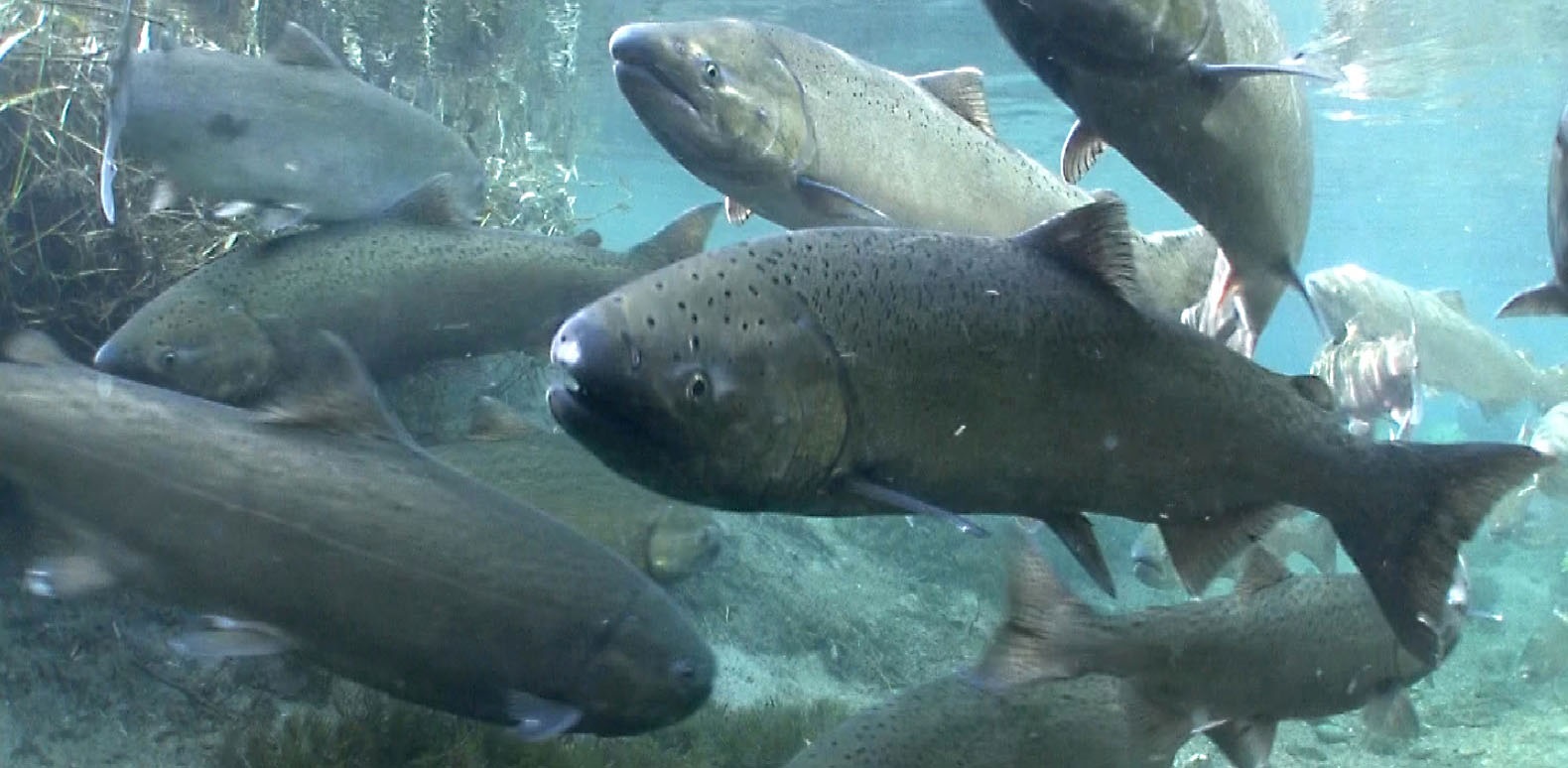
California’s Salmon Industry Set to Take Another Hit
Fisheries managers will impose the toughest restrictions on California’s salmon harvest in nearly a decade, hobbling the billion-dollar industry that depends on it. This year’s fall salmon run is estimated to be only a quarter of normal on California’s Sacramento River, due mostly to drought conditions and warmer ocean temperatures. As a result, officials at the Pacific Fishery Management Council last week moved to cut the commercial season by as much as a third of its standard length. >click to read< 10:42
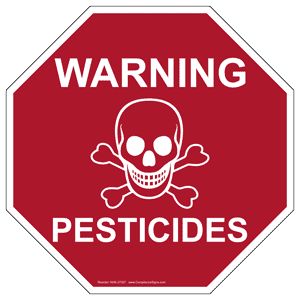
US review shows pesticides harm threatened salmon, whales
Federal scientists have determined that a family of widely used pesticides poses a threat to dozens of endangered and threatened species, including Pacific salmon, Atlantic sturgeon and Puget Sound orcas. The National Marine Fisheries Service issued its new biological opinion on three organophosphate pesticides — chlorpyrifos, diazinon and malathion — after a yearslong court fight by environmental groups. >click here to read< 19:58 
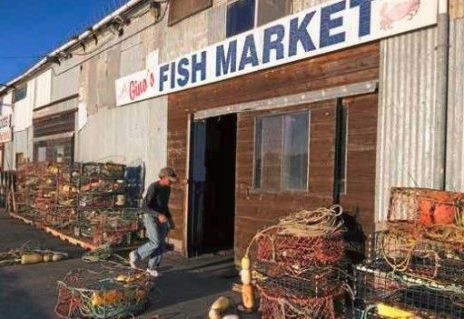
Fingers crossed there won’t be anything to be crabby about this season
With their pots stacked high and boat decks washed, commercial crab fishermen along the Central Coast are prepped for a season that is expected to start next Wednesday, on-time for the first time since 2014. And the getting could be good. “Ocean conditions over the past couple years, as the crabs that we’ll catch this year have matured, have been pretty good,” says Noah Oppenheim, executive director of the Pacific Coast Federation of Fishermen’s Associations in San Francisco. “It was good enough that we think the resources will be very healthy.” “Brutal,” “devastating,” “a disaster,” are all ways fishermen and heads of the industry have described the crab seasons of 2015 and 2016,,, click here to read the story 09:25
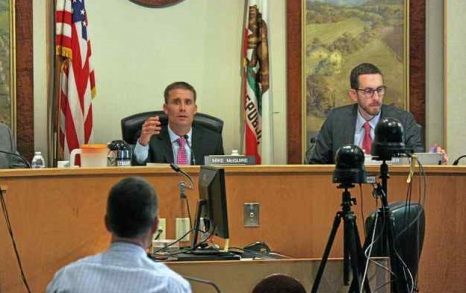
‘Time is of the essence’: California Fisheries face uncertainty
State regulators and fishing officials said at a Eureka hearing on Friday that only by working together can they overcome the trials and uncertainty that several California’s fisheries face today. With a poor salmon catch in 2017 and 2016 and a potential delay in the North Coast Dungeness crab season following three years of poor landings and abnormal ocean conditions, Pacific Coast Federation of Fishermen’s Associations Executive Director Noah Oppenheim said fishing fleets are still feeling the economic effects and that time to address the underlying issues is running slim. click here to read the story 08:46
Commerce chief Ross makes waves, roils fisheries rules
 Commerce Secretary Wilbur Ross has wasted little time in giving a jolt to the nation’s fisheries. In June, the 79-year-old billionaire investor who now oversees NOAA Fisheries singlehandedly extended the fishing season for red snapper in the Gulf of Mexico, ignoring protests from scientists and environmentalists that it could spur overfishing of the popular species. Then in an unprecedented decision in July, he handed a big win to New Jersey fishermen and the state’s Republican governor, Chris Christie, by overturning catch limits for summer flounder that had been approved by an interstate fisheries commission.,, “Secretary Ross finally challenged them — the first time in the history of the commission they got challenged — and they don’t like it,” said Donofrio, who gave the president a “Fishermen for Trump” bumper sticker at a recent event. “I love it. … The commission got kicked in the balls, and they don’t like it. That’s just too bad.” click here to read the story 12:27
Commerce Secretary Wilbur Ross has wasted little time in giving a jolt to the nation’s fisheries. In June, the 79-year-old billionaire investor who now oversees NOAA Fisheries singlehandedly extended the fishing season for red snapper in the Gulf of Mexico, ignoring protests from scientists and environmentalists that it could spur overfishing of the popular species. Then in an unprecedented decision in July, he handed a big win to New Jersey fishermen and the state’s Republican governor, Chris Christie, by overturning catch limits for summer flounder that had been approved by an interstate fisheries commission.,, “Secretary Ross finally challenged them — the first time in the history of the commission they got challenged — and they don’t like it,” said Donofrio, who gave the president a “Fishermen for Trump” bumper sticker at a recent event. “I love it. … The commission got kicked in the balls, and they don’t like it. That’s just too bad.” click here to read the story 12:27
Experts say BC salmon stocks not diminished by sea lice outbreak for now
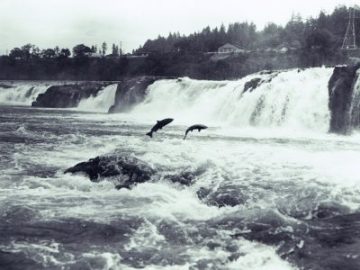 The price of salmon has shot up more than 15 per cent over the last three months, thanks to fish stocks being hit worldwide by an outbreak of sea lice. In Norway and Scotland, two of the world’s largest suppliers of salmon, sea lice outbreaks have made prices rise by a full 50 per cent, coupled with a huge algae bloom in Chile, the world’s second biggest producer of farmed salmon, and global production is down by nine per cent. But the market for Pacific salmon is not likely to see the same price spikes, according to Glen Spain of the Pacific Coast Federation of Fishermen’s Associations, who says that sea lice has so far been less of a scourge for Pacific Coast salmon. The tiny, naturally occurring parasite, found in both wild and farmed salmon, last proved to be a menace on the West Coast in 2015, when infestations were at their highest in five years. Read the story here 07:49
The price of salmon has shot up more than 15 per cent over the last three months, thanks to fish stocks being hit worldwide by an outbreak of sea lice. In Norway and Scotland, two of the world’s largest suppliers of salmon, sea lice outbreaks have made prices rise by a full 50 per cent, coupled with a huge algae bloom in Chile, the world’s second biggest producer of farmed salmon, and global production is down by nine per cent. But the market for Pacific salmon is not likely to see the same price spikes, according to Glen Spain of the Pacific Coast Federation of Fishermen’s Associations, who says that sea lice has so far been less of a scourge for Pacific Coast salmon. The tiny, naturally occurring parasite, found in both wild and farmed salmon, last proved to be a menace on the West Coast in 2015, when infestations were at their highest in five years. Read the story here 07:49
California fishermen win key ruling over Delta water supply
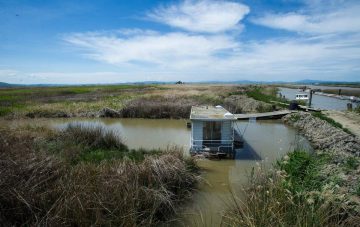 A group of commercial fishermen won a potentially significant court ruling in the seemingly endless battle over California’s water supply and the volumes of water pumped south through the Sacramento-San Joaquin Delta. A federal appeals court last week ruled that the U.S. Bureau of Reclamation, which delivers water from the Delta via the federal Central Valley Project, violated federal environmental law by renewing a series of two-year delivery contracts for south-of-Delta agricultural customers. The court said the bureau should have given “full and meaningful consideration” to the idea of reducing the amount of water available for delivery in the contracts. The ruling by the U.S. 9th Circuit Court of Appeals won’t void any of the supply contracts, said Stephan Volker, an Oakland lawyer representing the fishermen. But it could force the Bureau of Reclamation eventually to reduce the amount of Central Valley Project water pumped through the Delta to farmers and leave more water in the estuary to help endangered fish species. Read the rest here 16:51
A group of commercial fishermen won a potentially significant court ruling in the seemingly endless battle over California’s water supply and the volumes of water pumped south through the Sacramento-San Joaquin Delta. A federal appeals court last week ruled that the U.S. Bureau of Reclamation, which delivers water from the Delta via the federal Central Valley Project, violated federal environmental law by renewing a series of two-year delivery contracts for south-of-Delta agricultural customers. The court said the bureau should have given “full and meaningful consideration” to the idea of reducing the amount of water available for delivery in the contracts. The ruling by the U.S. 9th Circuit Court of Appeals won’t void any of the supply contracts, said Stephan Volker, an Oakland lawyer representing the fishermen. But it could force the Bureau of Reclamation eventually to reduce the amount of Central Valley Project water pumped through the Delta to farmers and leave more water in the estuary to help endangered fish species. Read the rest here 16:51
Devastated salmon population likely to result in fishing restrictions
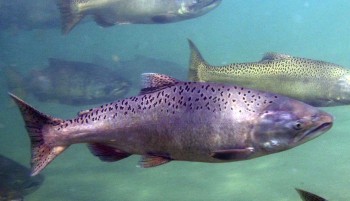 Northern California’s commercial anglers are bracing for restrictions on the upcoming salmon-fishing season after federal regulators projected there are half as many in the ocean compared to this time last year. Last week, the Pacific Fisheries Management Council released its annual population estimates for Chinook off the Pacific Coast. The council estimates about 300,000 adult fall-run salmon from the Sacramento River system are swimming off the coast this year. For the past several years, the forecasts have predicted more than 600,000 salmon. “It’s a 1-2-3 punch,” said Tim Sloane, executive director of the Pacific Coast Federation of Fishermen’s Associations. Read the rest here 21:43
Northern California’s commercial anglers are bracing for restrictions on the upcoming salmon-fishing season after federal regulators projected there are half as many in the ocean compared to this time last year. Last week, the Pacific Fisheries Management Council released its annual population estimates for Chinook off the Pacific Coast. The council estimates about 300,000 adult fall-run salmon from the Sacramento River system are swimming off the coast this year. For the past several years, the forecasts have predicted more than 600,000 salmon. “It’s a 1-2-3 punch,” said Tim Sloane, executive director of the Pacific Coast Federation of Fishermen’s Associations. Read the rest here 21:43
With sadness – Conservationist Zeke Grader, advocate for fish, dies
 Zeke Grader, a lifelong conservationist who loved wild fish, wild rivers and the good fight necessary to protect them, has died. He was 68. “You would probably not be eating a wild California salmon today if it were not for Zeke,” said his friend Tim Sloane, the executive director of the Pacific Coast Federation of Fishermen’s Associations. “He was not afraid of speaking truth to power. He wasn’t afraid of anyone.” Mr. Grader, 68, died Monday night of pancreatic cancer at a San Francisco hospice. Read the rest here 18:19
Zeke Grader, a lifelong conservationist who loved wild fish, wild rivers and the good fight necessary to protect them, has died. He was 68. “You would probably not be eating a wild California salmon today if it were not for Zeke,” said his friend Tim Sloane, the executive director of the Pacific Coast Federation of Fishermen’s Associations. “He was not afraid of speaking truth to power. He wasn’t afraid of anyone.” Mr. Grader, 68, died Monday night of pancreatic cancer at a San Francisco hospice. Read the rest here 18:19
Conservation and commercial fishing groups sue EPA over fish consumption in Wash.
![]() SEATTLE (AP) — A fight over how much fish people eat in Washington — and thus, how much toxic pollution they consume — is now in federal court. more@westportnews 22:50
SEATTLE (AP) — A fight over how much fish people eat in Washington — and thus, how much toxic pollution they consume — is now in federal court. more@westportnews 22:50
NAFTA Commission: Canada Must Respond to Concerns that Fish Farms Hurt Wild Salmon
![]() An international commission ruled this week (see PDF) that a citizen petition challenging Canada’s failure to protect wild salmon from industrial fish farms warrants an official response from the Canadian government. The Commission for Environmental Cooperation, an entity established under the North American Free Trade Agreement, determined the petition includes sufficient information that Canada may be violating its own conservation laws to trigger a formal response. [email protected] 14:18
An international commission ruled this week (see PDF) that a citizen petition challenging Canada’s failure to protect wild salmon from industrial fish farms warrants an official response from the Canadian government. The Commission for Environmental Cooperation, an entity established under the North American Free Trade Agreement, determined the petition includes sufficient information that Canada may be violating its own conservation laws to trigger a formal response. [email protected] 14:18
Fishermen Defend Increased Trinity River Flows to Protect Salmon
The Pacific Coast Federation of Fishermen’s Associations (PCFFA) represented by Earthjustice, filed intervention papers late Friday defending the planned release of Trinity River water to keep salmon alive in drought conditions. The groups will file a full brief with the court on August 13th. more@enews
(PCFFA) represented by Earthjustice, filed intervention papers late Friday defending the planned release of Trinity River water to keep salmon alive in drought conditions. The groups will file a full brief with the court on August 13th. more@enews






